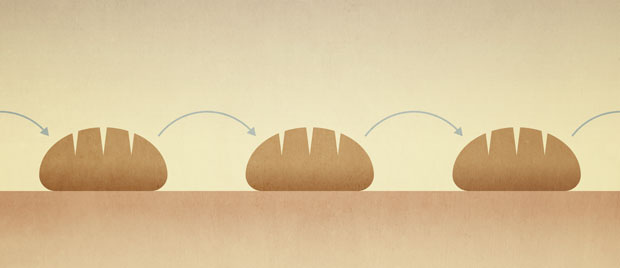What Does “Give Us this Day Our Daily Bread” Mean?

Jesus teaches us to pray that God would give us daily bread (Matthew 6:11). Obviously Jesus was not telling His disciples to pray only for bread. But bread was a staple in the diet of the Jews, and had been so for many years. Furthermore, bread was a powerful symbol of God’s provision for His people in the Old Testament. We remember how God cared for the Israelites when they were in the wilderness after their exodus from Egypt. Life in the wilderness was hard, and soon the people began to complain that it would be better to be back in Egypt, where they had wonderful food to eat. In response to these complaints, God promised to “rain bread from heaven” (Ex. 16:4). The next morning, when the dew lifted, there remained behind on the ground “a small round substance, as fine as frost. . . . It was like white coriander seed, and the taste of it was like wafers made with honey” (Ex. 16:14, 31). When God miraculously fed His people from heaven, he did so by giving them bread.
It’s interesting to me that in the language of Western culture, we sometimes speak of one partner in a marriage (it used to be almost exclusively the husband, but not so much these days) as the wage earner of the home. But more colloquially, we call that partner “the breadwinner.” Even in our slang, we use the word bread as a synonym for “money.” Bread remains, at least in our language, as a powerful symbol of the rudimentary basis of provision for our needs.
After the Korean War ended, South Korea was left with a large number of children who had been orphaned by the war. We’ve seen the same thing in the Vietnam conflict, in Bosnia, and in other places. In the case of Korea, relief agencies came in to deal with all the problems that arose in connection with having so many orphan children. One of the people involved in this relief effort told me about a problem they encountered with the children who were in the orphanages. Even though the children had three meals a day provided for them, they were restless and anxious at night and had difficulty sleeping. As they talked to the children, they soon discovered that the children had great anxiety about whether they would have food the next day. To help resolve this problem, the relief workers in one particular orphanage decided that each night when the children were put to bed, the nurses there would place a single piece of bread in each child’s hand. The bread wasn’t intended to be eaten; it was simply intended to be held by the children as they went to sleep. It was a “security blanket” for them, reminding them that there would be provision for their daily needs. Sure enough, the bread calmed the children’s anxieties and helped them sleep. Likewise, we take comfort in knowing that our physical needs are met, that we have food, or “bread,” for our needs.
This petition of the Lord’s Prayer, then, teaches us to come to God in a spirit of humble dependence, asking Him to provide what we need and to sustain us from day to day. We are not given license to ask for great riches, but we are encouraged to make our needs known to Him, trusting that He will provide.
If we find that God’s hand seems to be invisible to us and that we cannot discern His providential intrusion into our lives, that may be due partly to the way we pray. We have a tendency to pray in general. When we pray in general, the only way we will see the hand of God’s providence is in general. As we enter into prayer, this conversation and communion with God, and put our petitions before Him, pouring out our souls and our needs specifically, we see specific answers to our prayers. Our Father has invited us to go to Him and ask Him for our daily bread. He will not fail to provide it.